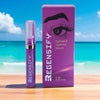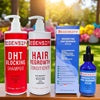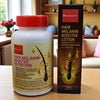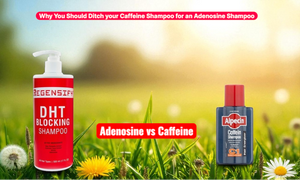WELCOME TO REGENSIFY
WELCOME TO REGENSIFY
Products
REGENSIFY Bodycare Collection

REJUVENATE YOUR BODY WITH REGENSIFY
REGENSIFY Eyecare Collection

REDENSIFY YOUR LASHES AND BROWS WITH REGENSIFY
REGENSIFY Haircare Collection

REDENSIFY YOUR HAIR WITH REGENSIFY

REVERSE GREY HAIR WITH REGENSIFY
Bundles
Adenosine vs Caffeine: Why You Should Ditch Your Caffeine Shampoo for an Adenosine Shampoo
August 05, 2025 5 min read

Does Caffeine really Work?
In 2018, the UK Advertising Standards Authority (ASA) issued a formal warning to Alpecin, stating that its advertising claims — specifically that caffeine shampoo "helps reduce hair loss" — were misleading. The ASA found that Alpecin failed to provide robust clinical evidence to support the efficacy of caffeine in treating hair loss. The ruling highlighted the gap between in-vitro lab studies and actual human clinical outcomes, reinforcing concerns that many caffeine-based shampoos rely more on marketing than on medical science. You can also read the news here. The critical question to ask here is if Caffeine does help in hair regrowth, why drinking many cups of coffee do not help at all when it comes to hair regrowth. We leave it to the readers here to decide. A key issue with using caffeine topically is its limited absorption through the skin. Caffeine molecules are relatively large, making it difficult for them to penetrate the scalp’s layers deeply enough to reach the hair follicles. For caffeine to block DHT effectively or stimulate growth, it needs to reach the follicles in significant concentrations, which topical application doesn’t always allow. As a stimulant, caffeine can increase scalp sensitivity, particularly if used in high concentrations or combined with other strong ingredients. Many caffeine products also use alcohol or other carriers to aid absorption, which can further irritate the scalp. For individuals with existing conditions like eczema or dermatitis, caffeine-based products might worsen symptoms, possibly leading to increased hair loss rather than improvement.
Why You Should Ditch Your Caffeine Shampoo for an Adenosine Shampoo
Most people turn to caffeine shampoos as a quick fix for hair thinning — but what if there's something clinically stronger, more biologically precise, and far more effective?
Meet Adenosine: the science-backed ingredient quietly replacing caffeine in medical-grade hair growth formulas across Japan and Korea. While caffeine may improve circulation, adenosine speaks the follicle’s language, sending molecular signals to actually grow hair.
Adenosine vs Caffeine: How They Work on Your Hair Follicles
Let’s break it down with a side-by-side comparison:
| Aspect | Adenosine | Caffeine |
|---|---|---|
| Primary Mode of Action | Directly stimulates dermal papilla cells in hair follicles | Increases scalp circulation to enhance nutrient delivery |
| Target Site | Hair follicle root (DP cells) — key site for hair regeneration | Blood vessels in the scalp, not the follicle itself |
| Cellular Pathway | Boosts FGF-7 (fibroblast growth factor-7), prolonging the anagen phase | Inhibits phosphodiesterase, increasing cAMP temporarily |
| Effect on Hair Cycle | Promotes new hair growth and maintains active growth phase | May slow hair loss, but not proven to trigger new growth |
| Mechanistic Depth | Acts at a biological signaling level that controls follicle behavior | Works via indirect stimulation (via circulation only) |
| Clinical Backing | Double-blind trials in humans; comparable or superior to Minoxidil | Mostly lab-based studies; weak real-world evidence |
| Best Application Format | Leave-on serums or tonics that penetrate the scalp | Mostly used in shampoos, with rinse-off limiting effectiveness |
| Speed of Results | Noticeable changes in 6 months with consistent use | Results vary; often subtle or temporary |
| Scalp Sensitivity | Well-tolerated, low irritation | May cause dryness or irritation in sensitive users |
| Long-Term Efficacy | Supports follicle regeneration and density improvements | Mostly maintains existing hair; limited regrowth potential |
🔍 What Makes Adenosine a Game-Changer?
Unlike caffeine — which passively improves blood flow — adenosine is an active communicator. It tells your hair follicles to grow by activating FGF-7, a protein involved in launching and extending the growth phase of hair.
Think of it like this:
-
Caffeine = delivery truck (brings nutrients to the scene)
-
Adenosine = architect (directs new construction at the root)
It’s the difference between nourishing hair and commanding it to grow.
❌ Caffeine is not a vasodilator in the same way that adenosine or minoxidil is.
In fact, caffeine is generally considered a vasoconstrictor — meaning it narrows blood vessels, the opposite of a vasodilator.
Here's a breakdown:
| Compound | Vasodilator or Vasoconstrictor? | Mechanism |
|---|---|---|
| Adenosine | ✅ Vasodilator | Binds to adenosine receptors → relaxes smooth muscle in blood vessels |
| Minoxidil | ✅ Potent vasodilator | Opens potassium channels → relaxes vascular smooth muscle → ↑ blood flow |
| Caffeine | ❌ Vasoconstrictor | Blocks adenosine receptors → leads to vessel constriction |
🧪 Backed by Clinical Science
Adenosine has been clinically tested in both men and women, showing results on par with Minoxidil — but without the hormonal side effects or scalp irritation.
-
In male trials, adenosine 0.75% showed similar effectiveness to Minoxidil 5%.
-
In female trials, it outperformed Minoxidil 2% and had higher user satisfaction.
-
Participants reported stronger, denser, and thicker hair in just a few months.
✅ The Takeaway
If you're serious about reversing hair thinning and restoring fuller growth:
-
✅ Caffeine may help maintain — but results are shallow and temporary.
-
✅ Adenosine tells your hair to grow — at the cellular level, with real science behind it.
💡 Ready to Upgrade?
Caffeine may boost circulation, but adenosine directly stimulates hair follicles for true regrowth. We do not deny that Caffeine may offer some sort of help to reducing hair loss. But if Caffeine is a grade B ingredient, then Adenosine is a grade A ingredient. Would you prefer a soccer team of all your dream grade A players, a mix of grade A and grade B players or just grade B players. The answer is obvious. Switch to an adenosine-powered shampoo, conditioner or serum and experience the difference that molecular-level hair growth can make. While one can argue that Adenosine + Caffeine will make a good combo, then why not have an Adenosine + Coenzyme Q10 combo, which can create a grade A synergistic effects than a grade B Adenosine + Caffeine combo? We talk about Adenosine + Coenzyme Q10 combo next time.
REDENSIFY YOUR HAIR WITH REGENSIFY
The Full Professional Bundle set comes with one set each of our DHT Blocking Shampoo, Hair Regrowth Conditioner and Redensifying Hair Regrowth serum at a super value deal. All three products are powered with Adenosine. Complete your REGENSIFY haircare with this full professional bundle set in three steps.
DOWNLOAD Hair Thickness Growth Effect of Adenosine Complex in male female pattern hair loss
DOWNLOAD Anti-hair loss effect of a shampoo containing caffeine and adenosine
DOWNLOAD Efficacy and Safety of Topical Adenosine for Androgenetic Alopecia in Adults
Disclaimer: All brand names and trademarks mentioned are the property of their respective owners. This article is intended for educational and informational purposes only, based on publicly available data and clinical studies.
Leave a comment
Recent Articles
-
Dutasteride vs Finasteride vs Oral Minoxidil: Latest Insights for Male Pattern Hair Loss
October 07, 2025
-
Kordel's vs REGENSIFY vs Trichoderm: The Ultimate Melatine Supplement
September 24, 2025
-
Battle of the Anti-Grey Titans: REGENSIFY Lotion vs Trichoderm Serum
September 22, 2025
-
Melatine®: The Black Sheep Secret to Fighting Grey Hair Naturally
September 20, 2025
-
The Ultimate Anti-Grey Trio: Greyverse + Darkenyl + MelanoGray. Repair, Fuel and Protect.
September 19, 2025
-
Darkenyl + MelanoGray: Double Defense Against Grey Hairs
September 16, 2025
-
Tyrosine and Grey Hair — Oral vs Topical Solutions
September 15, 2025
-
Hair Growth vs Hair Colour: Can Minoxidil Trigger Premature Greying? A new study suggests the answer is a YES.
September 13, 2025
-
Synergy: Adenosine and Coenzyme Q10: How They Help Prevent Grey Hair
September 10, 2025
-
REGENSIFY VS VIDA GLOW - Which AnaGain™ Nu formula works best to prevent hair loss?
September 01, 2025
Latest REGENSIFY Blog Posts
Share this product

Why You Should Ditch Your Caffeine Shampoo for an Adenosine Shampoo
Caffeine may boost circulation but adenosine directly stimulates hair follicles for regrowth. Learn why adenosine is superior ingredient in hair growth science.

































